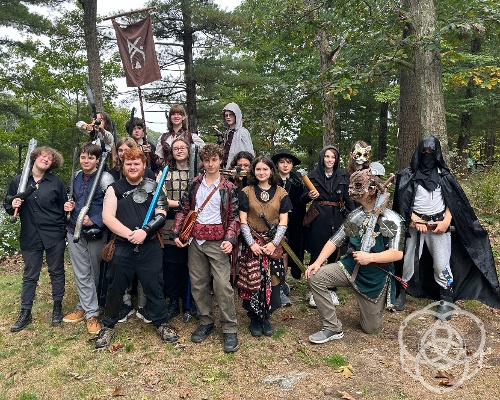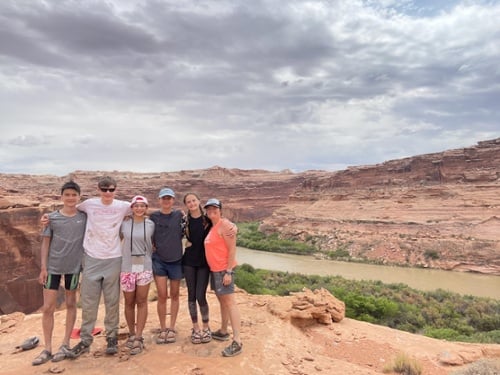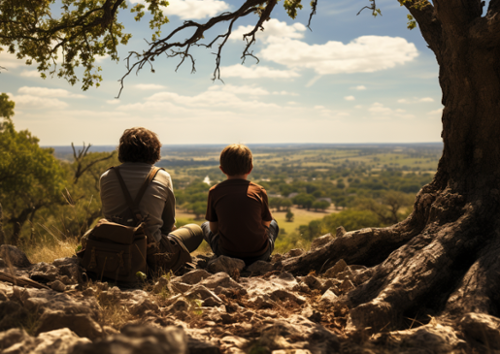1. Introducing LARP Adventure Programs
The excited chatter of anticipation fills the air as the founder and operator of the Camps of Friends, Jason, starts an inspiring conversation with personalities from LARP Adventure Programs - Eric David Love and Jenn Iannaconi. Camps of Friends is a platform dedicated to introducing children to enrichment activities and summer camps that step outside the conventional realm, thereby hoping to encourage new experiences and interactions.
2. The Unique Partnership Driving LARP's Success
Eric, pumped with a Masters in Education and an honors degree in Fine and Performing Arts, complements Jenn, an educational toy designer specializing in social development and play theory. Together they create an exceptional balance, proving valuable partners in their venture. They apply their respective knowledge and skills to manufacture a thrilling, educative mix offering LARP (Live Action Role Play) Adventure Programs.
These programs aim to foster a sense of community through imaginative self-expression and structured play. The LARP concept was introduced to Eric by one of his students attending a Dungeons and Dragons program. Eric's intrigue was piqued, and after a few experiences, he realized the potential in it.
3. Crafting an Immersive Educational Landscape
Using his diverse educational background, which involves stints as a martial arts instructor as well as a theater instructor, Eric structured a curriculum around LARP. Drawing from the power he had witnessed as a kid indulging in Dungeons and Dragons, he created a curriculum to teach literacy and subsequently apply that in the "classroom." Preparing students adequately before entering this immersive "classroom" likened it to learning the language and customs of a foreign country before visiting it.
4. Catering to a Spectrum of Interests
A query that surfaces during their conversation is about the kind of kids that the LARP Adventure Program attracts. Responding to the query, Eric mentions that there is no standard "mold" that these kids fit into. In fact, the programs cater to a spectrum of interests, including those children who don't fall neatly into boxes of traditional sports, arts, or tech programs. They offer an outlet for children who strive for something outside conventional norms of learning, who are like "star shapes trying to fit in square holes" of the school system. Allowing children space to explore immersive, engaging narratives, their program stands as an inclusive refuge in the world of education.
5. Embracing Diversity and Reshaping Learning
The diverse community they cater to includes those who don't neatly fit into the buckets of traditional arts, data, or computer science programs. A strong representation from the LGBTQ+ community adds to the diversity, possibly because of the warm and welcoming environment that the program offers. The program serves as a haven for children passionate about exploring and dissecting data in different ways, enabling them to question, analyze, and examine from various angles.
6. From Non-Gamers to Explorers: Widening the Scope of Interests
Over time, they've observed that not all children entering the program are gamers in the traditional sense. Many are attracted by the interactive experience, turning into gamers in the process. Some children juggle between the LARP Adventure Program and other activities like chorus, theatre, and sports, indicating a desire to experience and excel in diverse fields.
The interviewees relate their program to the Netflix series 'Stranger Things.' They perceive the series as a real-life LARP, presenting gaming kids accurately, just like in their program. The primary aim of their program, just like in the series and the legendary movie 'The Goonies,' is to go on adventures, overcoming challenges and failures together.
Relating to Joseph Campbell and Carl Jung's ideas, they discuss the importance of community even when tackling adventures that are to be handled individually. Ultimately, the adventure experience nurtures deeper understandings, solves problems, and draws strength from the community.
7. Expanding Horizons: Geographic Reach and Program Formats
The program primarily functions in the Boston metro area, including locations like Winchester, Arlington, Belmont, and Lexington. They also hold events stretching up to Western Massachusetts and Bethel, Vermont, all within two hours from Boston. The program is open to explore other areas as needs arise, fostering a love for learning and adventure.
The program's appeal, according to the participant, stems from its innovative approach to education by dynamically combining education, experimentation, and the arts. They mention that they offer various program formats, including after-school programs, residential weekend experiences, one-day off-site programs, day camps, and residential camps for children to get involved in live-action role-playing (LARP).
8. A Day in the Life of a LARP Program Participant
A typical day in the program begins with social cognition and structural games that could include improv acting or narrative interactive puzzles. These activities are primarily designed to enhance communication skills, personal expression, and to build trust among the participants.
After this, the focus shifts to activities emphasizing '21st-century skills' like LARP prop building, costume building, martial arts, game design, and world-building. These activities serve as tools for engaging students in their imaginary world, which forms the backbone of their learning experience.
A break for lunch precedes more physical activities, followed by the second block for developing interdisciplinary methods, rounding off with activities aimed at building confidence in social skills. All these activities require students to learn the language of LARP eventually, which they believe takes around 36 hours (a year of after-school programming or a week of day camp). The participant also adds that understanding philosophy is crucial since it opens up different perspectives and trains the mind to adapt to the imaginary world of LARP.
9. Bridge of Trust: Connecting Parents to LARP
An essential part of their service, beyond programming, is acting as a bridge between parents and the LARP world by translating and explaining what children are learning and experiencing in the program. This becomes a valuable service, particularly for parents who do not have prior exposure to LARP but are keen on knowing what their children are getting involved in.
10. Illuminating Transformations: Skills Development Through LARP
The conversation continued with the Jenn sharing a testimonial about a participant who, despite struggling with organizational skills, was able to meticulously plan and pack his LARPing armor. This incident showcased how the LARPing activities indirectly teach skills often perceived as challenging.
There's a notable emphasis on the transformative nature of drama-based activities for developing leadership skills. When turned into a play or game, certain learned behaviors, limitations, or self-judgments can be 'shed off', providing room for individuals to experiment with different values, emotions, or thoughts, inspiring a level of personal change.
11. LARP vs. Reenactments: Embracing the Unpredictability
Contrasting LARPing with reenactments, Eric elaborates that LARPing is unpredictable, which adds an element of spontaneity to it and is often a roadblock for traditional teachers. At any point in time, a participant's choice can steer the narrative in an entirely different direction, and the organizers must know how to adapt accordingly.
Jason compared managing the LARP Adventure program ( and Summer Camps ) to coaching a professional football team — every detail is planned out carefully, but the flexibility to pivot and adapt to changes is crucial to managing the unexpected elements thrown by the kids.
12. Financial Aspects: Pricing and Sustainability
Lastly, the pricing for their programs was discussed. The baseline cost is $180 per day, but prices may vary depending on various partnerships and yearly adjustments in response to inflation. The participant humorously referenced the constant challenge of keeping up with these fluctuations.
Eric elaborates on the cost structure, explaining that price variation depends on specifics like meals, accommodations, and partnership agreements. Generally, costs per hour for classes could range from $15 to $25 and additional fees could cater for materials. A significant portion of the funds received is invested back into the business to help it foster self-sustainability.
Operational costs, such as customer service, office rent, character sheets production, and salary for the staff, account for a substantial part of the income. Costs also go towards site supplies, catering to both building supplies and event production.
13. Into the Depths: Unique Program Endeavors
Eric & Jenn shares insight into some unique endeavors of their programs. They mention the ‘dungeon crawl’ events that are carried out in a rock climbing gym with adjusted lighting to create an underground impression. Despite the significant cost of renting such a facility, Jenn emphasizes its worth due to the immersive and thrilling experiences it offers to the kids.
Eric also shares anecdotal instances where kids have opted for their program over trips to Disney or other countries. For them, the value of the program lies in building camaraderie, fostering values, and creating lasting memories.
14. Expanded Horizons: LARPing Beyond Childhood
Additionally, plans to organize LARPing events for adults have been hinted at, one of which involved a Star Wars-themed event aboard a retired naval ship. The innovations are inspired by Nordic LARP and other popular LARPing communities.
15. Safety First: Ensuring a Protective Environment In LARP
The topic of child safety in such programs was brought up towards the end of the conversation segment.
Eric & Jenn discuss safety protocols, mechanisms, processes for transparency, the importance of communication, and methods for creating a supportive environment they liken to a "fishbowl."
Eric confirms that background checks are done on all personnel in line with legal requirements. Taking inspiration from his teaching background and mother's teaching of psychology in a martial arts setting, he emphasizes the program's focus on understanding, modesty, courtesy, integrity, self-control, and personal perseverance along with martial arts training.
The program aims to provide mentally safe spaces for participants to take risks, grow, and learn important life and language skills. They also have a card system in place, similar to the yellow and red card system in soccer, to ensure accountability among all participants.
16. Documentation: A Key Factor for Accountability
Documentation plays a pivotal role in safeguarding everyone involved. Every incident or behavioral action is recorded and kept on record. This contributes to an environment where everyone can feel safe, supported, and held to account.
Jennifer adds that they maintain a database of all their students and their specific needs, accessible even to seasonal staff. This is beneficial especially when dealing with behavioral issues. The logistics team also has access to this information for monitoring character development of the children attending events.
17. Information Flow: Communication and Transparency in Practice
The importance of communication is stressed here. Technologies such as school chats are deployed to stay connected while also ensuring minimal mobile phone usage during trainings or events. Multiple tiers of interaction are available ranging from peer-to-peer interaction to consulting older participants to consulting adult leadership.
Eric also speaks about his mother's work in law and how that influenced their thorough documentation strategy. In her case, non-sharing of information among different emergency services led her to realize the importance of shared information for providing efficient help and care, especially for individuals with communication issues.
18. Power of Personal Interaction: Steering Away from Social Media
In closing, they highlight the importance of human interaction and communication over reliance on social media. Jason mentions that stepping back from social media platforms has positively impacted his life.


%2072dpi-1.jpg?width=500&height=400&name=LARP%20Games%20Fridays%202016-2017%20Session%204%20(15)%2072dpi-1.jpg)


